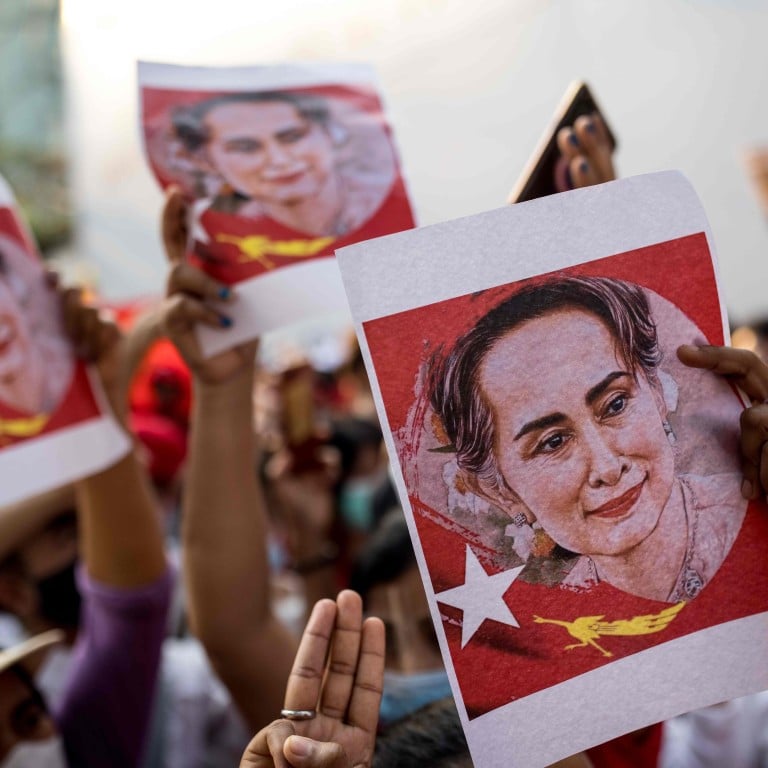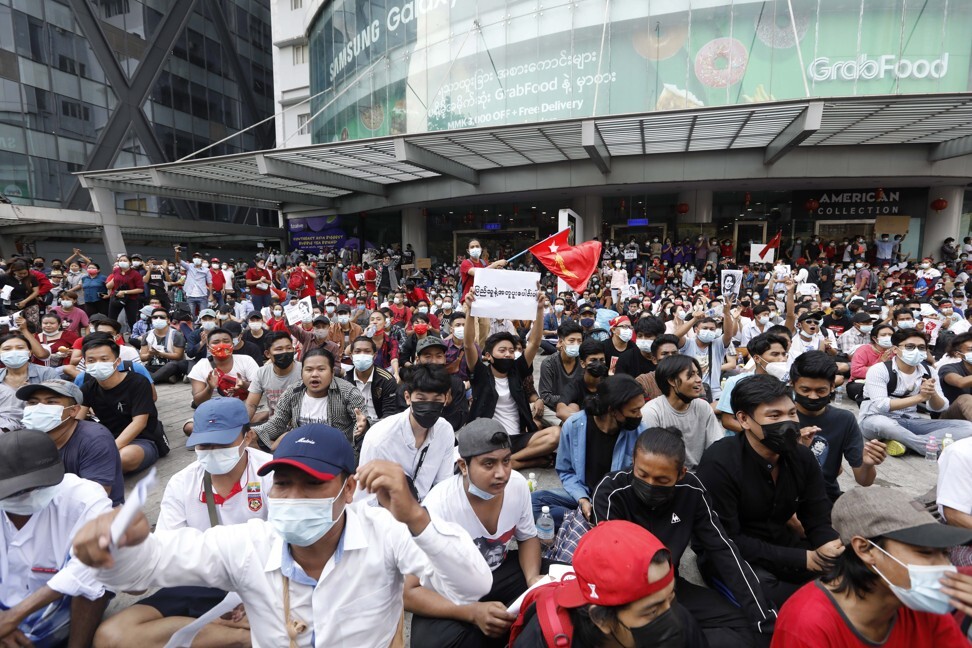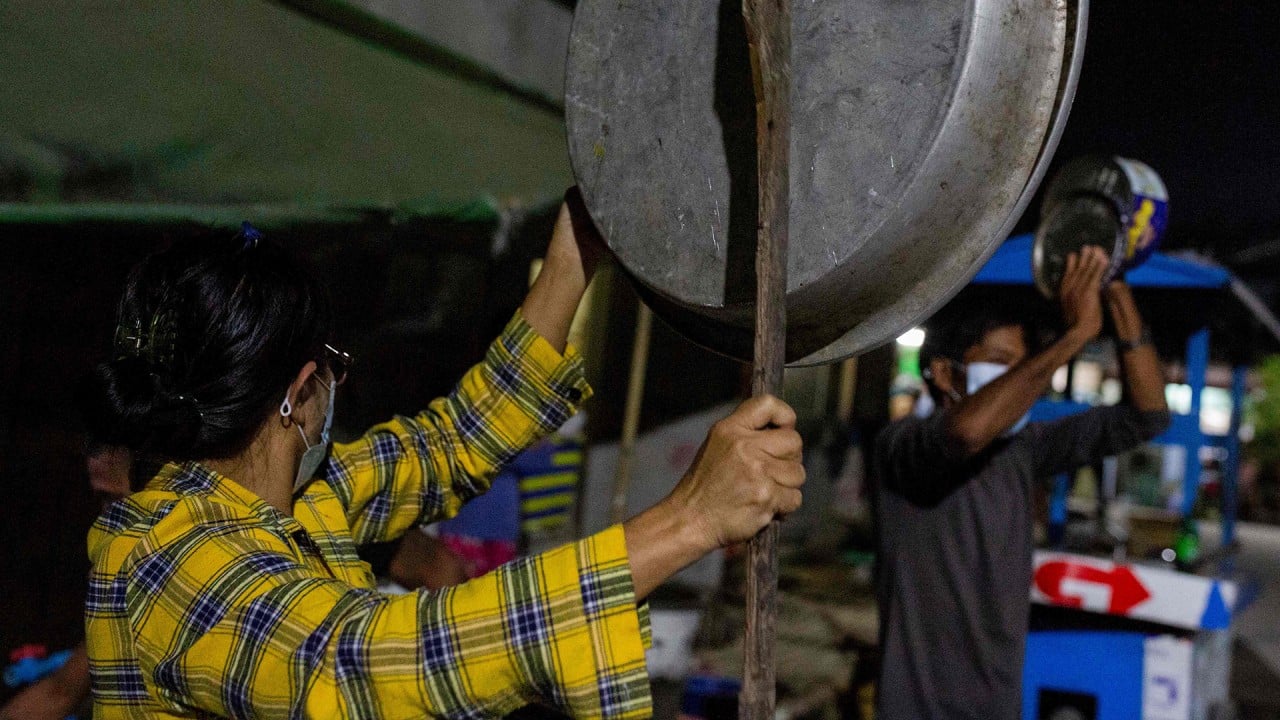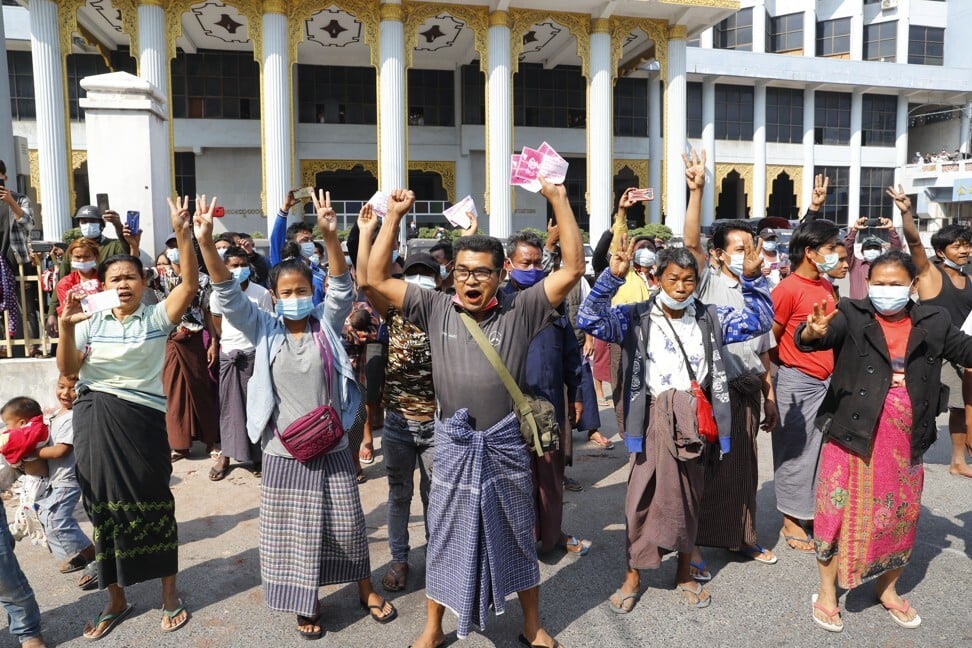
‘Every day is a nightmare’: Inside Myanmar, fears and shattered dreams as military clamps down on dissent
- From decades of impoverishment to a democratic blossoming and now under junta rule, the people of Myanmar are back to square one
- Although Aung San Suu Kyi has been detained and there is no popular leader to harness the anger of the people, political resistance remains alive
With a scholarship offered by a Western charity, she completed her undergraduate degree at a top university in Hong Kong, then worked for academic institutes and NGOs focused on reforms and governance in Myanmar before completing a graduate degree in Europe, also on a scholarship.
Was a ‘stubborn’ Suu Kyi too much for Myanmar’s military?
“If the military can initiate a coup so easily, there is no hope for the country,” said Erina Oo, who requested not to be identified by her real name. “Every day I wake up to my nightmare. I have not been able to concentrate at work since February 1,” she said referring to the day the Tatmadaw took over.
It was in 2011, under the quasi-civilian Thein Sein government, that a series of political and economic reforms began. Suu Kyi’s National League of Democracy, which had begun making inroads into parliament starting with the 2012 by-election, then won the majority of seats in the 2015 general election, and achieved another landslide victory in November’s election.
Although economic liberalisation had come slowly under the Suu Kyi-led government, and the country’s human rights record was still being criticised, largely due to the treatment of the Rohingya Muslim minority, people also no longer lived with daily fear, as they had under the military dictatorship. This alone was arguably the civilian-led government’s greatest achievement.

One of the most consequential transformations in Myanmar was the popularisation of telecommunications. People now carry smartphones regularly, despite recent attempts by the junta to cut off data flows, and have four mobile operators to choose from, including three foreign firms.
Just seven years ago, SIM cards remained rare luxuries, and were priced at over US$100 each, with the mobile network run by the single state-owned operator.
With the liberalisation of commercial and industrial activities, new malls, condominiums and office buildings have been springing up in cities across the nation. Industrial zones in Yangon and its outskirts draw workers who previously had limited job prospects. Prolonged electricity blackouts are no longer a daily nuisance of urban life.

01:24
Myanmar military coup: Yangon residents make noise to protest against army takeover
“We saw it with our own eyes,” said May Zin, who grew up mired in poverty not only because of the predatory regime in power at the time but also because of her father’s career as an opposition politician.
Her father, Thant Sin, had joined the 1988 student-led uprising and co-founded the National League for Democracy branch in Kyangin Township, Ayeyarwaddy Division, which borders Yangon to the east.
He was elected as a ward administrator in the 2015 general election and re-elected in 2020, but resigned from the government position on Tuesday as a protest against the military coup.
Her brothers, Thurein Linn and Tar Linn, were working as policemen before they were detained last week for criticising the new military government on Facebook. She and her family have not been able to reach the two.
She burst into tears thinking of the loss of the promise of a better future.
#MilkTeaAlliance has a new target brewing: Myanmar’s military
“We all have our plan for life,” said May Zin, who is the eldest sibling in the family and also the mother of a son. “For me, I want to go back to Myanmar in 10 years.”
“I feel so sad deep in my heart, and not just because of my brothers,” she said, adding that the country‘s development and people’s plans for the future had both been “arrested”.
The coup in the country has revived memories of the previous military government’s crackdowns on democracy uprisings, including the one in 1988, when thousands of pro-democracy demonstrators were killed, as well as the so-called “Saffron Revolution” in 2007 led by Buddhist monks, which was brutally suppressed by the military and resulted in over 1,000 arrests and dozens of deaths.
“We all know what the military did in 1988 and 2007,” said Tom Tan, a 28-year-old Myanmar national of Chinese descent who now lives in Taipei. “We all remember the days in the darkness.”
Although most Myanmar citizens who are now in their 20s or 30s, including Tan, did not participate in the uprisings, the spirit of resistance to the military regime has been transmitted to them through familial ties – and satellite radios.
Tan said that while growing up, he and his neighbours would clandestinely gather around a small radio and listen to Voice of America, Radio Free Asia or BBC Burmese, which all broadcast news that was not allowed to be aired on the only two state-run television channels in the country, Myanmar TV and Myawaddy TV.
As a measure to control the movements of people, he said, soldiers would come to each household to check if any unreported guests were visiting.
The memory of a teacher at his junior high school who was taken away and beaten to death in jail for complaining about the army also left an indelible mark on him.
“We don’t want our children to live under the military government,” he said.
LEADERLESS RESISTANCE
Outrage against the coup leaders is widespread both in Myanmar and among the Burmese diaspora.
But there is no conspicuous popular leader to harness the anger of the people because the army seized a number of politicians and activists before the junta declared it was taking over.
And yet, a historic moment could be brewing in the chronicle of political resistance in Myanmar, where every participant is potentially a leader by dint of carrying a smartphone and having access to social media – so long as they can access the internet.
Protesters have been sharing tips on how to bypass internet restrictions to log onto their social media accounts, where many have engaged in doxxing pro-coup politicians, publicising their names and businesses they own and calling for boycotts.
The military junta, which also uses Facebook, knows this, and so it has repeatedly shut down internet access as well as phone lines and blocked websites as means to contain the growing discontent. On Sunday, after nearly 100,000 protesters jammed the streets of Yangon, internet access had been restored, according to one of the foreign internet service providers, Norway’s Telenor.

Meanwhile, hundreds of civil servants in Myanmar, including medical workers and diplomats, have resigned as part of the civil disobedience movement. Tan said that over 20 of his high school classmates who now worked as health workers, as well as two diplomat friends, had resigned.
With doctors and nurses being the first to call for strikes against the junta, many public hospitals in Yangon – including one for Covid-19 patients – have been shut down.
Saw Htoo Htoo, a Myanmar national from the Karen ethnic minority, is mustering friends in Bangkok, to do whatever they can to support the civil disobedience movement inside Myanmar, including recording a protest song.
The 29-year-old, who works for a Thai multinational company, has been unable to reach his parents in Karen state, a less developed mountainous state in eastern Myanmar, by internet or phone since Thursday.
My friends inside Myanmar want to tell the international community, ‘Please continue to uplift the people inside Myanmar’
He said he received a phone call on Saturday, possibly from his mother, but he could not hear any words clearly except the initial “Hello, hello.”
“I will collect money for the civil disobedience movement once they start to accept donations,” he said. “We will support the civil servants who resigned.”
Tan joined the pro-democracy march in Taipei’s “Little Burma” area on Saturday morning, wearing a red face mask and a red shirt – the colour associated with the National League of Democracy and the current resistance against the coup.
“My friends inside Myanmar want to tell the international community, ‘Please continue to uplift the people inside Myanmar’,” he said. “They can listen to the radio even if the internet is cut off.”

